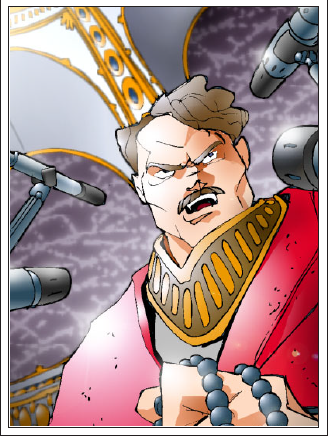The Twin Pillars
The Twin Pillars Party is the most important religious party in congress. Founded in TN 1651 in the Irrian region, the party was created by those who believe the Revisionist Church must play a role in the government of the state. The exact nature of this role has always been a subject of great debate within the party and within Norlight society as a whole. Most of the party's representatives feel that the state should remain secular but that the church needs to have some say on policy. The Twin Pillars exists to ensure this influence . Its longest standing platform is a call for the institutionalization of the Church's involvement, through a clerical committee which approves legislation in several key areas. The power and influence of the party has varied substantially over time, rising with waves of fundamentalist feelings and waning with periods of secular sentiment. The Revisionist revival spearheaded by Second Follower Thor Hutchison has been very good for the party, and their congressional representation has reached impressive proportions. Historically, whenever the Twin Pillars have achieved any large-scale electoral success, their agenda has been co-opted by a larger party - often the Liberal Democrats Democrats. The Liberal Democrats, however, have become a very secular party and the Twin Pillars are able to stand on their own to form part of the current government.
The upswing in the Twin Pillars' fortunes is a post-war phenomenon which began with Ali Rayas' assumption of the leadership in TN 1919. Rayas is the former mayor of Petropolis, a devout Revisionist, and a close friend of Marshal Pietr Paulk, the commander in chief of the Norlight Armed Forces. Taking advantage of the increase in religious activism and sentiment after the war, Rayas brought together the organizational networks of many political and social action groups, and used the established networks of church-run charities and community groups to revitalize the Twin Pillars. The party began to receive support from The Prophet's Shield, which now provided political contributions and the use of its facilities for meetings and lobbying, and is covertly engaged in political manipulation, intelligence gathering, and media manipulation. Rayas is a member of the Shield, but he is uncomfortable with its use of dirty tricks and tries to keep their use to a minimum. He is especially unsure about Reverend Maya Fajil, the Shield's leader, whom he suspects of having an agenda all her own. His success can be traced to the simple desire of most Norlight citizens to see the church assume an important political role. Since TN 1924, the party has been in an alliance with the People Party and forms part of the current government.
Structure
The Twin Pillars party i s built on a base of grass-roots local organizations which cooperate to support their representatives in Valeria. These groups, or circles, include anywhere from a few to over one-hundred people. Circles serve several important functions, beyond simply forming the membership of the party. The Twin Pillars takes community relations seriously and the circles act to bridge gaps between average citizens and the party leadership. Each circle i s expected to mobilize support for the party in their community. They also create forums for public expression on the issues of the day. The opinions-expressed in the forums are given serious consideration and party supporters expect the leadership to take these opinions into account. Most forums occur on a weekly or semi-seasonal basis and are held in community centers, open air meeting grounds or church basements. Circles are organized regionally and circle delegates nominate party candidates. Most decision-making bodies in the party are run like circles, with very little hierarchy within the group. Usually, a single speaker is named to be the moderator of debate and (if necessary) to be the public face of the circle, but no strict chain of command exists between members. The day-to-day management of the party is the responsibility of a special administrative circle, while issues of policy are handled by the caucus circle (the elected members) in consultation with regional representatives.
Public Agenda
The party is most concerned with pursuing its agenda of "moral government." The party was built with the convim.on that the "twin pillars" of Norlight society (the church and the state) must work in unison to guide the league. The religious revival of Second Follower Hutchison has inspired the party, and many members now consider an electoral victory in the TN 1936 elections a real possibility. With that in mind, some suggest a withdrawal from the current governing coalition in order to distance the party from President Adjanni. Ali Rayas has argued against such a move; he points to the influence he now wields as a member of the Chamber as evidence that the Twin Pillars can continue to have significant power in the government without sacrificing their chances for victory. Rayas is becoming increasingly concerned about the most extreme wings of his party. Some call for an outright religious state and Rayas had heard whispers of coups, the succession of the Irrian Plain or other extreme measures if the Twin Pillars finds itself sidelined once more.





Comments